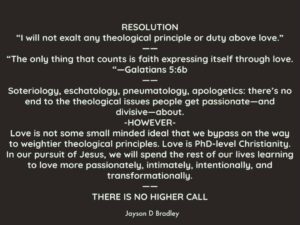
While my title for this article recalls what has to be one of the funniest scenes in cinematic history — as well as being one of my all-time personal favorites! 🤣 — the actual topic at hand is exceptionally serious.
Awhile back, I got suckered into one of those claiming-to-be-Christian social-media-troll feeding-frenzies I described in my article on cyber-bullying.
Here’s how it happened: months ago, I joined a FaceBook group where members contribute humorous Christianity-themed memes. They all possessed some degree of merit, whether inspirational or by merely poking fun at the common foibles of church-goers in general.
 What triggered the whole debacle was my response to a meme ridiculing several internationally-prominent ministers considered to be controversial by certain segments of Christendom. Every one of you would recognize their names if I listed them here. Several of them I like and admire. One of them is my pastor.
What triggered the whole debacle was my response to a meme ridiculing several internationally-prominent ministers considered to be controversial by certain segments of Christendom. Every one of you would recognize their names if I listed them here. Several of them I like and admire. One of them is my pastor.
I triggered the feeding-frenzy by asking the person who posted it — and the group at large — how they would like it if they were ministers and someone publicly mocked them in a similar manner. No attempts to defend of any of the individuals mocked, no name calling, no accusations or condemnation, no pronouncements of God’s judgment, not even a Scripture citation, just that one simple question.
From the resulting hue and cry, you would have thought I had just callously sacrificed a cute little kitten to Satan in prime time on national television. In retrospect, it was silly of me to say anything at all. I should have simply packed up my tent and stolen away into the night, exiting the group without comment. Oopsie! 🥹
As I’ve reflected on the incident, I felt the Holy Spirit moving on me to write a follow-up article to my article entitled “Filled With the Troll-y Spirit,” this time to confront the issue of mockery and ridicule in the Body of Christ with what the Scriptures have to say on the matter.
This is that article.
Psalm 1:1
Our keynote verse is Psalm 1:1, specifically the final phrase found there. I’ll cite it in several different versions to provide additional insights.
Blessed is the man who walks not in the counsel of the ungodly, nor stands in the path of sinners, nor sits in the seat of the scornful …
Psalm 1:1 NKJVBlessed is the one who does not walk in step with the wicked or stand in the way that sinners take or sit in the company of mockers …
Psalm 1:1 NIVOh, the joys of those who do not follow the advice of the wicked, or stand around with sinners, or join in with mockers …
Psalm 1:1 NLTWhat delight comes to the one who follows God’s ways! He won’t walk in step with the wicked, nor share the sinner’s way, nor be found sitting in the scorner’s seat .
Psalm 1:1 TPTHow well God must like you — you don’t walk in the ruts of those blind-as-bats, you don’t stand with the good-for-nothings, you don’t take your seat among the know-it-alls …
Psalm 1:1 MSGBlessed is the ish (man) that walketh not in the Etzah (counsel, scheme) of the Resha’im, nor standeth in the Derech Chatta’im, nor sitteth in the Moshav (seat) of the Leitzim (scornful, ones mocking and reviling) .
Psalm 1:1 The Orthodox Jewish Bible
Let’s take a closer look at some of the Hebrew word definitions here:
- blessed (esher)
- happiness, blessedness
- sits (yawshab)
- to dwell, remain, sit, abide, inhabit
- seat (moshav)
- seat, assembly, dwelling-place, dwelling, dwellers
- scornful (luwts)
- to scorn, make mouths at, talk arrogantly, mock, deride; to be inflated, scoff, act as a scorner, show oneself a mocker
Several translations I did not cite here specify Almighty God as the target of such scorners. While the original Hebrew can certainly include Him, it absolutely does not exclude mockery towards our fellow human beings. So we can roll our own sort of home-brew Amplified version to read thusly:
Happy and blessed are those who do not assemble and participate with those who inflate themselves to arrogantly scorn, mock, and deride anyone, whether Divine or human.
Psalm 1:1 Willis Expanded Version
I think it’s entirely safe to also state its corollary:
Unhappy and cursed are those who assemble and participate with those who inflate themselves to arrogantly scorn, mock, and deride anyone, whether Divine or human.
Psalm 1:1 Willis Expanded Version
Hmmmm… Which leads me to ask you the musical question:
In which of these 2 groups do you want to find yourself?
The Current Age
If there is one distinguishing characteristic of our modern times, it is mockery.
- Atheists and other skeptics mock Christianity and everything/everyone pertaining to it.
- Pietists and self-exalted guardians of doctrinal purity ridicule any minister or movement which has the temerity to disagree with their cherished and tightly held religious traditions and questionable interpretations of Scripture.
- The ignorant and/or stupid scorn the wise and the educated.
- The slender mock the overweight.
- Vegans/vegetarians jeer at carnivores who then return the favor.
- The so-called progressives ridicule conservatives — and vice-versa.
- The general populace heaps contempt upon politicians, a group fairly begging for it due to their rampant corruption and desperate-for-votes buffoonery in general.
- Add to those politicians assorted Hollywood actors, sports stars, news pundits, and various other celebrities/influencers who deride those disagreeing with them politically, philosophically, or religiously. Their exaggerated senses of self-importance and/or entitlement deceives them into thinking they are the true arbiters of all that is good, true, right, and praiseworthy. From the Olympian heights of their colossal egos, they virtue-signal their superiority over us mere mortals by espousing ludicrous causes célèbre (human-caused climate change, transgenderism, defunding the police, etc.), almost all of which epically fail to resonate with the average working man/woman on the street.
- Etc., etc., etc., ad infinitum, ad nauseam
Back in the day, such contempt was typically confined to political cartoons, op-ed pieces, stand-up comedy routines, and late-night-television monologues. Since the advent of the Internet — and especially social media! — literally everyone owning an Internet-capable device installed with a social-media app can now join in, spewing their hate-filled bile for the dubious “benefit” of anyone in any nation willing to waste their time reading or listening to it.
What Does the Word Say?
As with any topic worth discussing, we need to take a long, hard look at what the Scriptures say on the matter. Here is some of what I’ve found:
The Old Testament
Surely He scorns the scornful , but gives grace to the humble.
Wisdom calls aloud outside; she raises her voice in the open squares… “How long, you simple ones, will you love simplicity? For scorners delight in their scorning , and fools hate knowledge…
Proverbs 1:20,22
Proverbs 3:34The fear of the Lord is the beginning of wisdom, and the knowledge of the Holy One is understanding. For by me your days will be multiplied, and years of life will be added to you. If you are wise, you are wise for yourself, and if you scoff, you will bear it alone .
Proverbs 9:10-12A wise son heeds his father’s instruction, but a scoffer does not listen to rebuke. Proverbs 13:1
A proud and haughty man — “Scoffer” is his name; he acts with arrogant pride. Proverbs 21:24The humble also shall increase their joy in the Lord, and the poor among men shall rejoice in the Holy One of Israel. For the terrible one is brought to nothing, the scornful one is consumed, and all who watch for iniquity are cut off — who make a man an offender by a word, and lay a snare for him who reproves in the gate, and turn aside the just by empty words. Isaiah 29:19-21
In each of the verses I’ve just cited, the word “scoff” or “scoffer” is the same Hebrew word luwts found in Psalm 1:1.
My final Old Testament passage comes from the Book of Proverbs:
A worthless person, a wicked man, walks with a perverse mouth; he winks with his eyes, he shuffles his feet, He points with his fingers; perversity is in his heart, he devises evil continually, He sows discord. Therefore his calamity shall come suddenly; Suddenly he shall be broken without remedy.
These six things the Lord hates, yes, seven are an abomination to Him:
A proud look , a lying tongue, hands that shed innocent blood, a heart that devises wicked plans, feet that are swift in running to evil, a false witness who speaks lies, and one who sows discord among brethren .
Proverbs 6:12-19
- perverse (ik-kesh-ooth’)
- distortion, crookedness
- points (yarah)
- to throw, cast; to shoot arrows; to point out, show
- sows (shalach)
- to send; to stretch out, extend, direct; to send away; to let loose
- discord ( midyan )
- strife, contention
- abomination (to‘ebah)
- a disgusting thing, abomination, abominable
First please note God’s promise concerning those who sow discord: calamity will suddenly come upon them and they shall be broken without remedy. And I’m fairly certain doing anything which disgusts our Heavenly Father is not going to bring positive results, either!
The New Testament
Now let’s take a look in the New Testament:
Now I urge you, brethren, note those who cause divisions and offenses , contrary to the doctrine which you learned, and avoid them. For those who are such do not serve our Lord Jesus Christ …
Romans 16:17-18And I, brethren, could not speak to you as to spiritual people but as to carnal, as to babes in Christ. I fed you with milk and not with solid food; for until now you were not able to receive it, and even now you are still not able; for you are still carnal. For where there are envy, strife, and divisions among you, are you not carnal and behaving like mere men? 1 Corinthians 3:1-3
Now the works of the flesh are evident, which are: adultery, fornication, uncleanness, lewdness, idolatry, sorcery, hatred, contentions, jealousies, outbursts of wrath, selfish ambitions, dissensions, heresies, envy , murders, drunkenness, revelries, and the like; of which I tell you beforehand, just as I also told you in time past, that those who practice such things will not inherit the kingdom of God. Galatians 5:19-21 (italics mine)
Before going further, let’s take a look in the Greek lexicon at the words I emphasized in Paul’s list of “works of the flesh:”

- contentions (eris)
- contention, strife, wrangling
- jealousies (zelos)
- excitement of mind, ardour, fervour of spirit
1. zeal, ardor in embracing, pursuing, defending anything
2. zeal in behalf of, for a person or thing
3. the fierceness of indignation, punitive zeal
4. an envious and contentious rivalry, jealousy - outbursts of wrath (thumos)
- passion, angry, heat, anger forthwith boiling up and soon subsiding again
- selfish ambitions (eritheia)
- apparently, in the NT a courting distinction, a desire to put one’s self forward, a partisan and fractious spirit which does not disdain low arts; partisanship, fractiousness
NOTE: This word is found before NT times only in Aristotle where it denotes a self-seeking pursuit of political office by unfair means. Paul exhorts to be one in the mind of Christ not putting self forward or being selfish (see Philippians 2:3). James 3:14 speaks against having selfishness or self-promotion in your heart.
- dissensions (dichostasia)
- dissension, division, sedition
- heresies (hairesis)
- a body of men following their own tenets (sect or party)
dissensions arising from diversity of opinions and aims
Please note the definition for “heresies.” That Greek word found in Galatians 5 does not mean false doctrines violating orthodox essential Christian doctrine as the term is used in our modern vernacular. Instead, it means folks who divide the Body of Christ over their personal opinions and agendas.
Selah!
Let’s move on:
If anyone teaches otherwise and does not consent to wholesome words, even the words of our Lord Jesus Christ, and to the doctrine which accords with godliness, he is proud, knowing nothing, but is obsessed with disputes and arguments over words, from which come envy, strife, reviling, evil suspicions, useless wranglings of men of corrupt minds and destitute of the truth, who suppose that godliness is a means of gain. From such withdraw yourself.
1 Timothy 6:3-5
 Let’s examine some of the Greek words used in that passage:
Let’s examine some of the Greek words used in that passage:
- proud (tuphoo)
- 1) to raise a smoke, to wrap in a mist; metaphorically: to make proud, puff up with pride, render insolent; to be puffed up with haughtiness or pride
2) to blind with pride or conceit, to render foolish or stupid - obsessed (noseo)
- to be sick; metaphorically: of any ailment of the mind; to be taken with such an interest in a thing as amounts to a disease, to have a morbid fondness for
- arguments over words (logomachia)
- to contend about words; to wrangle about empty and trifling matters
- reviling (blasphemia)
- slander, detraction, speech injurious to another’s good name
- useless wranglings (paradiatribe)
- useless occupation, empty business, misemployment
The word for “strife” in that list is eris, the same word we found in Galatians 5:19-21 where it was translated as “contentions.”
I find it fascinating that the same Greek word for speaking evilly of deity, blasphemia, can also be applied to such speech directed towards other people.
Flee also youthful lusts; but pursue righteousness, faith, love, peace with those who call on the Lord out of a pure heart. But avoid foolish and ignorant disputes, knowing that they generate strife. And a servant of the Lord must not quarrel but be gentle to all, able to teach, patient, in humility correcting those who are in opposition, if God perhaps will grant them repentance, so that they may know the truth, and that they may come to their senses and escape the snare of the devil, having been taken captive by him to do his will.
2 Timothy 2:22-26But avoid foolish disputes, genealogies, contentions, and strivings about the law; for they are unprofitable and useless. Reject a divisive man after the first and second admonition, knowing that such a person is warped and sinning, being self-condemned. Titus 3:9-11
In the Greek, that term “divisive man” is the word hairetikos. Yes, that’s indeed the selfsame word where we derive the English term heretic. Tragically, in social media, no one has the authority to admonish such folks, call them into account, and disfellowship them for their contentions (eris).
Therefore, laying aside all malice, all deceit, hypocrisy, envy, and all evil speaking , as newborn babes, desire the pure milk of the word, that you may grow thereby, if indeed you have tasted that the Lord is gracious.
1 Peter 2:1-3
- malice (kakia)
- malignity, malice, ill-will, desire to injure
- evil speaking (katalalia)
- backbiting, defamation, evil speaking
The Words of Jesus
Please note in 1 Timothy 6:3 where Paul wrote, “…does not consent to wholesome words, even the words of our Lord Jesus Christ…” Out of all Jesus’ words recorded in the gospel accounts, what do we find among them?
Judge not, that you be not judged. For with what judgment you judge, you will be judged; and with the measure you use, it will be measured back to you. And why do you look at the speck in your brother’s eye, but do not consider the plank in your own eye? Or how can you say to your brother, “Let me remove the speck from your eye;” and look, a plank is in your own eye? Hypocrite! First remove the plank from your own eye, and then you will see clearly to remove the speck from your brother’s eye.
Matthew 7:1-5Jesus said to him, “‘You shall love the Lord your God with all your heart, with all your soul, and with all your mind.’ This is the first and great commandment. And the second is like it: ‘You shall love your neighbor as yourself.’ On these two commandments hang all the Law and the Prophets.”
A new commandment I give to you, that you love one another; as I have loved you, that you also love one another. By this all will know that you are My disciples, if you have love for one another. John 13:34-35
Matthew 22:35-40
 We are commanded to love those who are unlovable, including those who are doctrinally so. Point-of-fact:
We are commanded to love those who are unlovable, including those who are doctrinally so. Point-of-fact:
- Jesus knew Judas was going to betray Him. He washed Judas’ feet anyway.
- He prophesied that Peter would deny Him 3 times. He washed Peter’s feet anyway.
- He knew all the other disciples except John ben Zebedee would abandon Him. He washed their feet anyway.
How much more are we called to follow His example when dealing with those pesky fellow believers who don’t see portions of God’s Word exactly the same way as we do?
Just to clarify one possible point of contention with my words here: I’m not talking about swallowing false doctrines and blindly following their teachers. We are indeed commanded to “abhor that which is evil and cling to that which is good.” (see Romans 12:9b), but nowhere does the New Testament permit us to hate and publicly hold in contempt those with whom we disagree doctrinally — or far worse, to publicly do so in front of the lost on social media — or anywhere else for that matter.
In Closing
I’ll leave you with the following thought from a commentary on Revelation 2 regarding the church at Ephesus for your prayerful consideration:
It has been said that a person’s greatest weakness inevitably lies in the area of his major strength. This was true of the congregation at Ephesus. The ability of the church to detect doctrinal deviation had created a climate of suspicion. Love was noticeably absent among its members.Robert Mounce
For a sobering glimpse into how the spirit realm is influencing this whole matter, check out my article entitled, “Where are We Going? And Why are We in This Hand-basket? — The Spiritual Perspective. It explains why so many folks are so incredibly resistant to correction, especially concerning the topic at hand.
Thanks for reading!




Outstanding food for thought Steve. I’ll pass it on the knights who say NEEE
Go away or I will taunt you a second time-a!